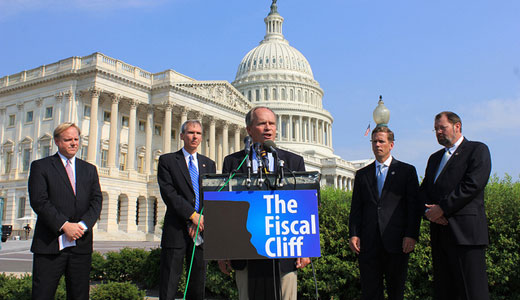
In the early aftermath of World War II, the Truman administration was hell bent on reversing U.S. foreign policy from wartime cooperation to unrestrained hostility towards the Soviet Union. To win public acceptance for this policy U-turn, Senator Arthur Vandenberg of Michigan advised the president “to scare the pants off the American people.”
Which is exactly what Truman (and the entire establishment) did. They let loose the dogs of anti-Soviet, anti-communist hysteria on the American people. And by and large, they were successful. Anti-Soviet and anti-communist ideas came to dominate people’s thinking, crowding out, if not destroying, the democratic, progressive, and internationalist outlook of the New Deal and World War II years.
We know what followed – a permanent war economy and society, a spiraling arms race hanging like a sword over humanity’s head, successive and costly military interventions in far flung lands, the rise of the national security state, the crushing of the working class and democratic movement for more than a decade of McCarthyism, the long-term weakening of the left and labor movement, to name a few of the worst effects.
But what does this have to do with today? More than you think.
The U.S. ruling class, stealing a page from Truman’s playbook, is trying again to “scare the pants off the American people.”
But the object of fear in this case isn’t the Soviet Union, which unfortunately no longer exists. It’s the “fiscal cliff” and the supposed economic abyss that lies beyond it.
One day it is Charles Krauthammer of the Washington Post opining that going over the fiscal cliff will bring “a double-dip recession, 9 percent unemployment, and a totally gridlocked Congress …”
The next day it is Steve Rattner, financier and Democratic Party operative, writing “… we don’t know if our economy will take the icy plunge off the fiscal cliff.”
And a few days later, New York Times columnist David Brooks joins this chorus, claiming that we are going to bankrupt our children if we don’t rein in deficits and cut “entitlements.”
But guess what? So far the American people are not running scared. In the November elections and in recent public opinion polls their desire is clear – to go forward, not backward. No evidence exists to suggest that they are ready either now or in the future to destroy Social Security, Medicare, and Medicaid, or roll back domestic spending, or resolve the budget crisis on the people’s backs.
In short, they are not ready to become accessories to their own undoing.
But here is where it gets complicated. Not all of the political class in the nation’s capital shares this point of view.
The mantra of Republicans in the Senate and House, as you would expect, is cut, cut, cut and privatize, privatize, privatize.
But what might surprise you is that some Democrats are buckling in the face of the so-called “fiscal cliff.” Contrary to the wishes of voters who elected them, they are seemingly open to reductions (disguised as “reforms”) in earned income benefit programs (a much better term than entitlements to describe Social Security, Medicare and Medicaid – which workers pay for through their taxes) in exchange for winning an increase in marginal tax rates on the top layers of the capitalist class.
This position, while far less extreme than the Republican/tea-party right, is a problem. It goes in the wrong direction. It’s unnecessary. And it countermands the election mandate.
There are other steps that would really ensure the long-term sustainability of the earned-income programs – Social Security, Medicare and Medicaid – and at the same time help curb the deficit. They include: cutting the military budget, raising taxes on the wealthy and corporations to levels that existed in the 1960s, raising the income cap on Social Security deductions, implementing single-payer health care and, short of that, making the federal government the sole buyer of prescription drugs.
This is what should be on Congress’s legislative agenda – not more cutbacks in living standards.
For more than 30 years, the earned incomes and job opportunities of working people have been tracking downward, while the unearned income and profit-making opportunities of the wealthiest corporations and families have been tracking upward, and both at historically unprecedented rates.
That’s what’s really scary. And that more than anything else is what needs to change.
Photo: Fiscal cliff scaremongers: Reps. Robert Dold, Jr., R-Ill.; Charlie Bass, R-N.H.; Steven LaTourette, R-Ohio; and Daniel Lipinski, D-Ill., held a news conference last August warning about the looming “fiscal cliff.” TalkRadioNewsService CC 2.0












Comments